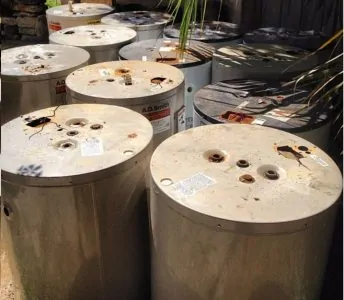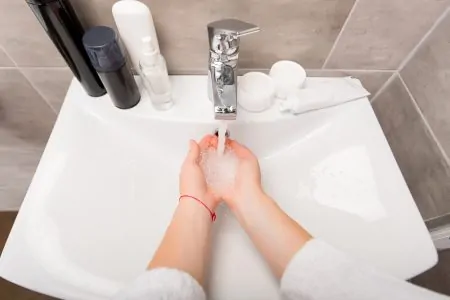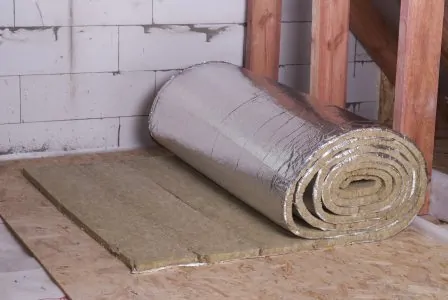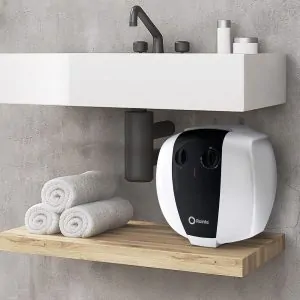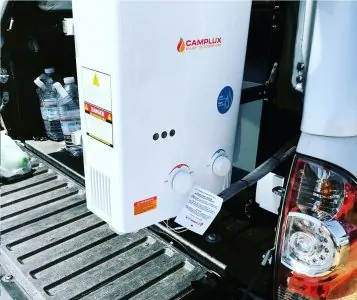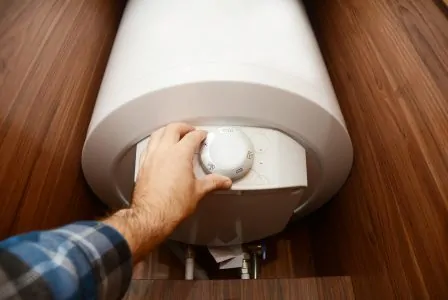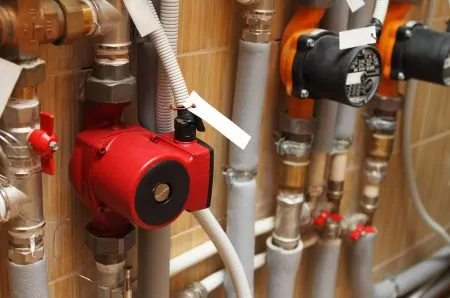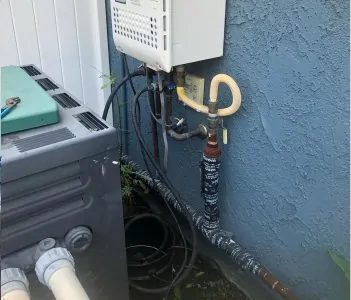Water heaters are one of the most expensive parts of any home, so it’s important that they last for as long as possible. When investing in a new heater, you will want some idea of how long you can expect the unit’s lifespan to be.
Some water heaters can last for decades but no heater lasts forever. How long it lasts will depend on the type of heater, how often it is used, and how well it is maintained.
In this article, we will take a closer look at the average water heater lifespan, how many years you might expect your heater to last, and what you can do to prolong its usefulness.
Key Takeaways
- Average lifespans: Gas water heaters last 8-12 years, electric ones 10-15 years, and tankless heaters 20-30 years.
- Factors affecting lifespan: Improper installation, usage, quality, and infrequent maintenance can all shorten a water heater’s life.
- Signs of replacement: Strange noises, tinted water, lower temperatures, and pooling water indicate the need for a new water heater.
- Extend service life: Check the pressure-relief valve, anode rod, remove limescale, and flush sediments regularly to prolong your water heater’s lifespan.
How Long Water Heaters Last on Average
Water heaters are generally not expected to last long beyond 15 years. This ultimately depends on the type of water heater, its power or fuel source, how well it is maintained, and the quality of its materials and manufacturing.
Gas Water Heaters
Gas storage tank water heaters are generally the preferred type among homeowners. They are usually considered the most economically-friendly option. Unfortunately, their average lifespan is a few years shorter than other types.
Gas water heaters usually last anywhere from eight to 12 years. The most common reason why they fail is corrosion as gas units become increasingly vulnerable to corrosion as they age.
Inside the tank, there is something called an anode rod. Manufacturers include this to protect the inner lining. The anode rod attracts corrosive particles using a method called electrolysis.
The anode rod can only take so much. After a couple of years, it starts to corrode and can’t attract more particles. Without the influence of the rod, the particles drop to the bottom where they affect the tank instead.
Eventually, the tank will start leaking, signaling the end of its service life.
Electric Water Heaters
Electric storage tank water heaters work in similar ways to gas-powered units. Even so, the average life expectancy of an electric unit is 10 to 15 years, rather than the eight to 12 of its gas counterpart.
Instead of using a gas burner to heat the water, an electric boiler uses heating elements. There are usually two of these elements inside the tank. Like gas boilers, their lifespan is highly dependent on proper maintenance.
The heating elements are usually the root of heater failure as they collect sediment build-up over time. It is crucial to clean or replace the elements as sediment will eventually stop them from working effectively.
Tankless Water Heaters
Tankless water heaters are very different from traditional boilers. Rather than having a storage tank, they are tankless, as their name suggests. The unit doesn’t hold any water and instead works on demand (1).
When you open the hot water tap, cold water circulates the unit, receiving heat from the heat exchanger. As a tankless model doesn’t store water, it is spared from the corrosion that affects tanks. As a result, the average life expectancy of a tankless unit is at least 20 years — some even reach 30 years of service!
When a tankless heater finally reaches the end, it’s usually due to a leak in the heat exchanger. This often leads to corrosion and the need for a replacement. Fortunately, this rarely occurs before the 15-year mark. As always, this depends on the overall quality of the unit.
What Affects a Water Heater’s Lifespan
The typical lifespan of a water heater is at least 10 years, but a few factors can shorten this (2).
1. Improper Installation
Water heaters need proper installation. This doesn’t only mean wiring it correctly. Water heaters should also be placed in an upright position in a well-ventilated space.
A well-ventilated area is critical for your safety, as it will prevent carbon monoxide build-up. Poor ventilation can also dramatically shorten your appliance’s lifespan.
Another thing to consider is the risk of flood damage. Although the interior of your unit is rust-resistant, the exterior probably isn’t. This means placing your water heater on the floor, where it’s more likely to be exposed to floods, isn’t ideal.
Water will rust the coating as well as the pipes and lines. Eventually, your unit may be rusted and no longer safe to use.
The best location for your water heater is therefore an out-of-the-way but accessible spot. “Accessible” means it should not be obstructed by anything. This will help with maintenance and also fulfills the requirements for fire and health-hazard safety.
Stay Safe
2. Usage
Water heaters aren’t flawless machines that can deliver great volumes of continuous hot water forever. They will eventually wear out.
This means that constantly running large quantities of water through your unit will push it to the limit. Over time, your boiler becomes more susceptible to wear and tear. The corrosive effects of hot water also take a toll.
3. Quality
This is something to consider before you purchase a new water heater. Most experts recommend spending a little extra on quality — and with good reason. Cheap water heaters will likely need to be replaced far sooner than more expensive models.
If you are fortunate, more expensive heaters will pay for themselves with lower bills and longer lifespans.
One telltale indicator of good quality is a long warranty. The longer the warranty, the more faith the manufacturer has in its construction. No company will place a 10-year warranty on a product it thinks will only last six.
You should also look for a water heater with thick insulation. It should have durable heating elements and porcelain or glass-lined casing. Other features such as a self-cleaning function can help reduce mineral or sediment buildup.
4. Infrequent Maintenance
If you live in an area with a hard water supply, frequent maintenance is essential (3). Hard inlet water, with increased mineral content, can significantly reduce the lifespan of a water heater.
The higher mineral content also decreases the unit’s efficiency. Even in areas with softer water, mineral deposits are bound to be present to some extent.
The best way to counter this is by performing frequent maintenance on your unit. Flushing the system will minimize any potential build-up. Many newer models also provide you with the benefits of including a self-flushing function.
Signs Your Water Heater Needs Replacing
If you pay close attention, your water heater might give you some clues that its service life is nearing an end. If you know that your unit is in the latter half of its life, look for the following signs:
1. Strange Noises
Some water heaters always make some kind of noise. If you suddenly hear rumbling or banging noises, it’s time to take a closer look.
The noise is due to sediment build-up which is a common symptom of infrequent maintenance. The mineral buildup falls to the bottom where it hardens and creates a thick crust. Later, when you use the unit, it will creak and bang.
2. Tinted Water
Tinted water is never a good sign. Whether it’s red or yellow, it is generally a sign of rust. It’s essential to determine where it’s coming from.
Turn on a cold faucet. If it runs clear but your hot water is discolored, there is rust in the water heater. There isn’t much you can do at this point other than replacing the unit.
3. Lower Temperatures
If you notice that your water heater is struggling to provide hot water, it could be nearing its end. It might be that the water isn’t as hot as it used to be or that the amount is much less. Either way, know when to replace it before it stops completely.
4. Pooling Water
Water that is pooling near the base of your unit is generally bad news. It might just be a fitting or valve that needs tightening or replacing. However, if it comes directly from the tank, it’s likely an indicator of cracks and corrosion — a death sentence for water heaters.
How to Extend Service Life
Unless your unit is already near the end, there are some steps you can take to extend its lifespan. Here’s what you can do:
- Check pressure-relief valve: This is here to prevent an explosion. Place a bucket by the discharge pipe and raise the lever for the valve. If water doesn’t come out, replace the pressure-relief valve.
- Check anode rod: Drain the tank and check the anode rod. If it looks corroded, replace it immediately.
- Remove limescale: Limescale can prevent your unit from working efficiently. Remove it by flushing the tank with undiluted white vinegar.
- Flush sediments: As mentioned earlier, sediments are bad news for a tank. Flush the tank frequently to remove any buildup (4).
FAQs
In Summary
A high-quality water heater has the potential to last a decade or two. If you take good care of it, it might last even longer. Its lifespan also depends on the type — tankless units usually last at least a few years longer.
Look out for signs of corrosion and rust. Perform regular maintenance and be mindful of your water usage. Doing this should help your water heater perform better and for longer.
